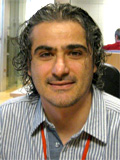
Juan A Bernal is expert in Molecular Biology and DNA metabolism and Head of the Inherited Cardiomyopathies lab and Head of the Viral Vector Unit at CNIC since 2015. His main research interest lies in understanding the molecular basis of hereditary cardiomyopathies with the aim of identifying new targets for drug-repurposing and treatment.
Dr Bernal is Bachelor of Biological Sciences (1999), Specialist in Molecular and Cell Biology (2001), and defended his doctoral thesis in 2004 at the Institute of Natural Resources and Agrobiology of the CSIC in Seville on the transcriptional regulation of the tumour suppressor p53.
In 2004 he moved to England to carry out a postdoctoral stage supported by an EMBO long-term scholarship in the laboratory of A. Venkitaraman (Hutchison MRC Centre for Translational Research, Cambridge, 2004-2010). During this period, he worked on different aspects of DNA metabolism, from the initiation of replication, to how the DNA structure changes after gene damage, to the relationship of problems during the initiation of replication with the segregation of sister chromatids during cytokinesis.
He returned to Spain in 2010 with a prestigious Ramón y Cajal fellowship, and started an independent line of work, focusing on the development of new models for the study of human cardiac diseases in induced pluripotent cells (iPS), as well as in animal systems, and became Assistant Professor at the CNIC in May 2015.
Thanks to Dr. Bernal´s strong expertise in molecular biology, his group has pioneered in the application of a new approach to generate tissue-specific transgenics by transducing wild type animals with adeno-associated virus (AAV) to express genes that induce arrhythmogenic right ventricular cardiomyopathy (ACM) or any other monogenic cardiac disease. These viruses are generally used as tools in gene therapy and adapted to transgenic animal generation. Thanks to these new models he has been able to demonstrate, among other theories, that extreme exercise triggers the development of ACM, that PKP2 mutations alter actomyosin cytoskeleton and cardiac function, and that mild elevation in blood pressure triggers atheroma plaque development. Recent studies of his group have also discovered a connection between the new SARS-CoV-2 virus and PKP2 in heart desmosome homeostasis, which generates a transient ACM phenotype in patients with cardiac infection, identifying new targets for COVID-19 treatments.
| Surname and name | Position | CV | Extension | |
|---|---|---|---|---|
| Martín Pérez Daniel | Postdoc researcher | --- | Ext. 70311 | Contact |
| Arévalo Núñez de Arenas María | Predoc researcher | --- | Ext. 70749 | Contact |
| Garcia-Quintans Nieves | Graduate technician | --- | Ext. 70185 | Contact |
| Sanchez Ramos Cristina | Graduate technician | --- | Ext. 70730 | Contact |
| Artesero Pérez Sheila | Technician | --- | Ext. 70287 | Contact |
| Chacón Aguilera Gloria | Technician | --- | Ext. 70992 | Contact |
| Sanguino Acosta Ángeles | Technician | --- | Ext. 70755 | Contact |
| Ortiz Loo Lucía | Visiting student | --- | Ext. 71193 | Contact |






